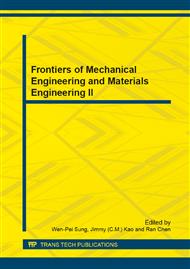p.1381
p.1386
p.1390
p.1396
p.1403
p.1407
p.1411
p.1415
p.1419
A Holistic Incentive Model of Information Sharing in Supply Chain
Abstract:
It is broadly recognized by global companies that information sharing is one of the key aspects of coordination amongst parties in a supply chain. Companies can efficiently manage the product flow and information related to the issues such as production capacity, customer demand and inventory at lower costs through information sharing. Different incentive mechanisms were presented to tackle the complexities in information sharing. However, the relation between different incentive mechanisms and the performance measures of supply chain is not yet developed. The objectives of this paper are to: understand and appreciate various incentive mechanisms available for information sharing in supply chain, propose a holistic model to explore different incentive mechanisms both quantitative and qualitative and their value in supply chain.
Info:
Periodical:
Pages:
1403-1406
Citation:
Online since:
October 2013
Authors:
Price:
Сopyright:
© 2014 Trans Tech Publications Ltd. All Rights Reserved
Share:
Citation:


